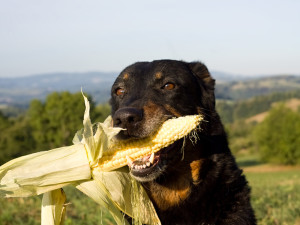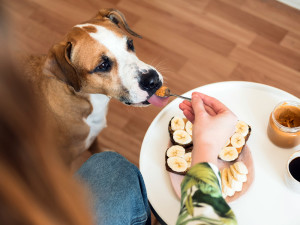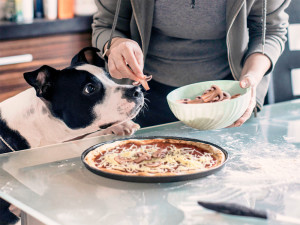Can Dogs Eat Hot Dogs?
They may want a taste this summer, but read this first.

Share Article
With barbecue season upon us, there is no doubt your pup is angling for a bite or two of whatever deliciousness is sizzling on the grill. Hot dogs are one of the most popular American grill items, so it’s likely your dog will get at least a whiff of a hot dog sometime in the next few months.
The question is, can they also indulge in a bite or two? The truth is that hot dogs are not a healthy food for dogs and most contain ingredients that are unsafe and even toxic to dogs. Here’s what you should know before sharing your hot dog with your pup.
Nutrition facts about hot dogs for dogs
Learning how the sausage literally gets made turns some people off but it doesn’t take away from their deliciousness if you are a true hot dog lover. And it certainly will not deter your dog from wanting to try one. A hot dog, also known as a frankfurter, is considered to be a form of cooked, smoked sausage.
Hot dogs are traditionally made from meats like pork, beef, or turkey. Meat trimmings are mixed with spices and preservatives to create a batter that is then fed into through an automated stuffing machine, pumping the meat mixture into casings to create that classic hot dog shape. The hot dogs are then smoked and cooked and some styles will have the casings removed before they are packaged.

There are many varieties of hot dogs on the market nowadays including some that are plant-based and some that are uncured to avoid certain preservatives. As a result, their nutritional profiles will vary. In general, hot dogs are typically high in protein, fat, and certain additives, like salt.
Are hot dogs good for dogs?
Hot dogs are not good for dogs. This is because they often contain ingredients that are unhealthy or may even be toxic to dogs. However, there are some nutrients in hot dogs that are important for dogs.
This includes:
Protein: Hot dogs tend to be high in protein, an important source of amino acids. These are crucial building blocks used for many vital functions throughout the body. Protein is also a good energy source for dogs.
Fat: Hot dogs are typically high in fat. Fat is also an important energy source for dogs and helps them maintain a healthy coat. The taste and smell of fat is also very appealing to them. There are many important reasons to avoid giving your dog high-fat foods. Sometimes, however, a higher fat treat can be useful in tempting a dog to eat or for hiding medications. This may not be a safe choice for every dog so be sure to speak with your vet before testing this out.
Can dogs eat any kind of hot dog?
Hot dogs are a broad category of foods that can contain so many different ingredients; it is important to evaluate each product individually to determine whether or not it is safe for your dog. Many brands of hot dogs contain seasoning like garlic powder and/or onion powder, both of which can be toxic to dogs if they consume enough.
It is best to avoid feeding your dog any foods that contain these ingredients. Also, for dogs with food allergies, hot dogs contain a surprising number of ingredients, so you’ll want to make sure to check the ingredient list thoroughly for any possible allergens. This is also true of plant-based hot dogs, which often contain spices, like garlic and onion, and may contain wheat as well.
Are hot dogs completely safe for dogs?
Hot dogs are not completely safe for dogs; many brands contain ingredients that are unhealthy for dogs and may even be toxic. If you do want to share food from your barbecue with your pup, your best options are going to be plain, lean meats like white meat chicken or turkey that do not contain any seasoning, skin, or bones.
Some of the factors that make hot dogs less safe for dogs include:
High salt: Foods containing large amounts of sodium chloride, or salt, should be avoided in dogs. If they eat the occasional bite of salty food, this typically leads to increased thirst and might increase their need to pee temporarily. If they regularly eat high-salt foods, or eat a lot of salt in one sitting, this can lead to changes in their sodium levels that can have more serious consequences including increased blood pressure, vomiting, diarrhea, and in severe cases, swelling of the brain.
High in fat: While fat is an important component of a healthy diet for dogs, high-fat snacks or the occasional table scrap can be detrimental. For dogs who are not accustomed to that much fat in their diet, a high fat snack can cause digestive upset including vomiting and/or diarrhea. For some dogs, it can also trigger more serious pancreatitis, and of course, high-fat snacks can lead to weight gain and related health problems like diabetes and/or arthritis.
Toxic ingredients: Many hot-dog brands contain spices, like garlic and onion powders, which can be toxic to dogs. While they have to consume enough to get sick, it can be difficult to determine how much of each spice is in a given hot dog. Smaller dogs may be especially at risk since they can get sick from a smaller quantity of these toxins. It is best to avoid feeding your dog any foods that contain possible toxins.
Preservatives: Not all hot dogs contain preservatives, or the same preservatives, but some of the ingredients used to extend their shelf life can also be unhealthy for dogs. A classic example are the nitrates traditionally used as preservatives. Nitrates have been associated with an increased risk of certain cancers when consumed frequently. Even brands that claim to be uncured or preservative-free sometimes use extracts of celery as a natural source of nitrates.
Choking and other injuries: While you may not intend to share a hot dog with your pup, they have a knack for knowing when everyone is distracted just enough for them to snag one on their own. Try to keep your dog far from the grilling area to avoid injuries like burns and be sure to keep trash out of reach as well. Given their shape, large pieces of hot dog can also pose a choking hazard for dogs, as can any skewers, plastic wrapping, or utensils that come with the meal.
The bottom line: Can dogs eat human food?
Dogs can and do eat many human foods. It can be fun and fascinating to get to know your pup’s preferences and to spice up their regular food with the occasional new treat. Knowing what foods are safe to share is so important as there are many foods that can be perfectly fine for us but are toxic or unhealthy for our pets.
Additionally, dogs have their own unique nutritional requirements and need to eat a complete and balanced dog food diet daily to meet their needs and be their healthiest.
Dogs who eat too many treats and table foods may not get enough of the nutrients they really need, which can lead to nutritional deficiencies, illnesses, and poor health. In other cases, dogs may be unintentionally overfed if they get lots of snackies in addition to their dog food. This can lead to weight gain and health problems as well.
The best approach is to use treats and table foods sparingly, as less than ten percent of your dog’s overall intake. If you use treats and table snacks strategically, they can also be great motivators during training sessions, and may help to keep your pup busy with food puzzles and interactive toys.
Other foods that are safe for dogs
Apples can be a crunchy, high-fiber snack.
Eggs are a good high-protein option.
Other foods that are dangerous
Ribs are another barbecue delicacy that are off-limits to dogs.
Grapes and raisins are toxic and should be kept out of reach too.
Chocolate contains toxic compounds that can cause serious illness in dogs.
FAQs (People also ask)
How much hot dog can a dog eat?
This depends on the specific ingredients, but in most cases, hot dogs should be avoided altogether or just used for the occasional bite-sized treat and no more.
Is it OK to give dogs hot dogs?
Hot dogs are not healthy for dogs and some contain ingredients that may be toxic to dogs.
Why do dogs like hot dogs?
Foods that are high in fat and protein are appealing to dogs and hot dogs contain both.
Can dogs eat vegetarian hot dogs?
This depends on the ingredients but many brands contain ingredients that are not safe for dogs like garlic and onions.
References:
Harvard Health Publishing: Nitrates in Food and Medicine: What's the Story?opens in new tab
Merck Veterinary Manual: Salt Toxicosis in Animalsopens in new tab
National Hot Dog and Sausage Council: How Hot Dogs are Made: The Real Storyopens in new tab
Scientific American: What’s in your Wiener? Hot Dog Ingredients Explainedopens in new tab
Tufts Clinical Nutrition Service: What Nutrients are Essential for My Pet?opens in new tab

Dr. Amy Fox, DVM
Amy Fox, DVM is a small animal veterinarian in New York City with over thirteen years of experience in a mixture of general practice, emergency medicine, and shelter medicine. A lifelong animal lover, Dr. Fox studied biology in college and then worked as a veterinary nurse before pursuing veterinary school at Cornell University. Her expertise includes surgery, dentistry, and management of chronic conditions, and she is interested in toxicology, pain management, nutrition, care of senior pets, and educational outreach. Dr. Fox also enjoys writing about veterinary medicine and teaching, and her work has previously appeared in Spruce Pets. In her free time, she loves to cook, garden, go for long runs, and hang out with her goofy mixed-breed dog May, who provides never ending comic relief!
Related articles
![Woman feeding her corgi dog green beans.]()
Can Dogs Eat Green Beans?
Here’s why they can chomp on these veggies all they want.
Can Dogs Eat Blackberries?
The yummy treat is safe and full of antioxidants.
![Having breakfast and peanut butter with dog at home.]()
Can Dogs Eat Peanuts?
Peanuts are a great occasional protein-packed snack, but pay attention to this guidance.
Can Dogs Eat Chocolate?
No isn’t a strong enough answer here. Learn why.
![Women in the kitchen baking mushroom pizza with her dog.]()
Can Dogs Eat Mushrooms?
Your dog is a fun-gi, but be careful which shrooms they eat.
Can Dogs Eat Onions?
Add them to the list of no-nos in the kitchen. Here’s why.








